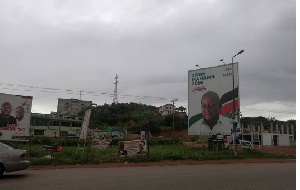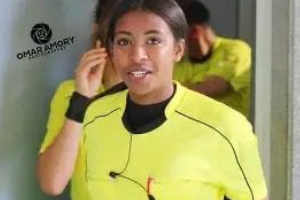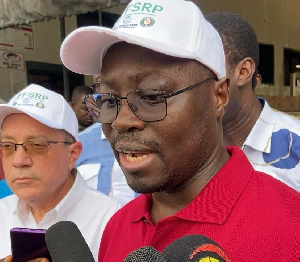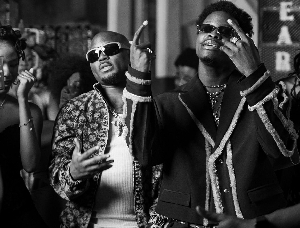By Manasseh Azure Awuni
I spent the past weekend in Cape Coast. Like any other town or city in the country, one thing was obvious. The smell of election was very thick in the air. And one hardly moves without seeing signs of the impending elections – billboards and campaign posters advertising all manner of characters, who need our mandate to have unfettered access to the national purse.
But judging from what one sees around, the election seems like a one-horse race. And this is what I mean: take, for instance, the entrance of the new site of the University of Cape Coast campus. You are greeted with a gigantic billboard of the presidential candidate of the governing National Democratic Congress (NDC). That is to the right. To the left is another huge but smaller billboard of the parliamentary candidate of the NDC for the Cape Coast North Constituency, Kobby Acheampong.
The university is a large and very important constituency and the political parties contesting the elections would want to make themselves visible to the voting population here. But, like in other parts of Cape Coast, it seemed there were no competitors, or rather there were unserious competitors if one was to judge the seriousness by the size and visibility of billboards.
At the UCC entrance for instance, while one can see the NDC billboards at about 200 metres away, the New Patriotic Party (NPP) parliamentary candidate had a miserable and inconspicuous banner of her and her Presidential Candidate announcing a campaign launch. That banner surely needs elevation to be seen.
At the main traffic intersection in Cape Coast, the story is the same. One can see huge billboards of the NDC’s Cape Coast South Parliamentary candidate, Kweku Ricketts-Hagan and his Presidential candidate outshining all other billboards in the area. As one travels from Cape Coast to Accra, the script is the same – the NDC’s visibility dominance has no competition.
I recently traveled by road from Accra to Tamale, then to Mole and back to Tamale. I again went from Tamale to Bolga, to Navrongo, Paga, Sirigu, Bongo and through a number of towns and regions. And I can say the situation is the same. The nation is awash with NDC colours and billboards.
In Accra, the visibility of the NDC and its candidate is more pronounced than in other regions. There are huge billboards of the NDC Presidential Candidate at almost every major intersection in the Capital city. All the streetlight poles on the George Walker Bush Highway in Accra are adorned with mini-billboards of President Mahama. It gives a spectacular look when one has a wide view of promotional images while cruising along the highway.
If one is to judge the intensity of the 2016 election campaign by the visibility of billboards, then one is safe to conclude that it is a one-horse race. And if one is to judge the seriousness of the political parties in this election by their visibility on the ground, then one is sure to conclude that only one party is serious – and that is the governing NDC.
In reality, however, the election is a two-horse race. The opposition NPP has chances of winning. So why is the NPP missing? The only huge billboards I have seen so far of the NPP’s Nana Addo Dankwa Akufo-Addo are two – one at Alajo (in Accra) where he is featured by the Ayawaso Central NPP parliamentary candidate and the one featured by George Andah as one enters the Awutu Senya West Constituency in the Central Region.
With regards to radio and television commercials, I have heard of only one NPP commercial that plays on the Midday News on Joy FM, while the NDC’s long commercials (like mini-documentaries) started running on television three or four months ago.
So why is the NPP missing? Are they not serious? Why is their campaign even so slow? Why are sounds from their campaign and rally grounds so poor while sound bites from the NDC rallies are so clear? Why don’t they get very quality equipment like their counterparts in the NDC?
Well, the answer is simple. The billboards, posters and expensive commercials are not acquired with leaves or sand. They cost money. Huge sums of money! But the NPP is broke. Or to put it bluntly, the NPP has no opportunity to steal our money for the campaign. I am saying this because in 2008, I was in Ghana. And I saw what I consider the most extravagant campaign in the history of Ghana. The NPP was in government.
The NDC in 2008 was as miserable as the NPP in 2016. And the NDC in 2008 was accusing the NPP of incumbency abuse as the NPP does in 2016. The NPP is right today. And the NDC was right in 2008. There is an abuse of incumbency today. And there was an abuse of incumbency in 2008. The only difference is that the NPP was displaying complacent opulence while the NDC is displaying desperate opulence.
In 2008, I voted and covered the elections in the Krachi West Constituency of the Volta Region. When I travelled from Accra to Kete-Krachi, I called my brother and told him that from what I had seen, the NPP was going to win hands-down. From Accra through the Eastern Region and the middle Volta to Northern Volta, every place and everybody was bathed in the colours of the NPP. All the tertiary students from the universities, polytechnics and other higher institutions of learning who came to Krachi to vote were bused in by the NPP.
In 2008, the tertiary students who came in served as party agents for the NPP while some school dropouts and jobless youth were mostly those who were party agents for the NDC in Krachi West. The NDC seemed to carry the stigma of ancient leprosy outcasts and no one seemed to get near it. The party was not very attractive. That is often the fate of an opposition party without cash. Almost all the top musicians endorsed the NPP and went ahead to compose campaign songs for the party. The NDC took the remnants.
The NPP in 2008 dominated the media. There were visible attempts to sabotage the NDC, especially in the state-owned media. This view is very well supported by the European Union Monitoring Team’s report on how the media covered the elections. I was an intern at GTV and I can attest to the naked discrimination against the placement of NDC stories and commercial ads.
I remember how Richard Quashigah, then NDC Propaganda Secretary and now MP for Keta, was turned away when he brought a campaign commercial for his party. In that commercial, two young graduates were accusing the NPP government of destroying the economy and creating joblessness. The political broadcasting committee of GBC said the commercial was in bad taste.
The committee insisted that the NDC could have made its point without attacking the NPP. A few days to the election, GTV played television commercials of the NPP, in which the NDC was described as thieves and murderers. Anyone who doubts this accusation of bias against the NDC, may do a content analysis of how political stories were covered and how political ads were placed by the Daily Graphic newspaper.
In terms of commercials, the NPP dominated the NDC in some of the NDC tabloids. It wasn’t strange that when the NDC won power, the heads of GBC, Graphic Communications Group and the GNA were all forced out of office before their tenure ended.
In 2008, the NPP held its last campaign at Accra Academy Park in Accra while the NDC held its last rally in Tema. The NPP’s rally was telecast live on GTV. On GTV’s prime time news at 7:00pm that evening, the NPP’s rally, which had been given live coverage by GTV was given a more prominence than the NDC’s. In fact, the NDC Presidential Candidate, Prof. John Evans Atta Mills, was not given a sound bite. It was that bad.
Today, NDC parliamentary candidates are launching campaigns that are more glamorous and expensive than their national campaign launch in 2008. The NPP are struggling to raise funds to hold rallies. So what is the source of the NDC’s wealth?
That is the point I want to make in this piece. And your guess is as good as mine.
When the NPP was accused in 2008 of stealing our money and splashing it irresponsibly in the elections, they often retorted defensively: that they made their money before coming into politics. Last year, a letter emerged of how a Prudential Bank loan facility the NPP contracted to help in the 2012 campaign was still unpaid.
From what we are seeing today, it cannot be true the NPP used their personal funds to do what they did in 2008. If the NPP wins the 2016 elections, the 2020 elections will witness filthy expenditure and unspeakable exploitation of incumbency from their camp. They are worse but smarter than the NDC in this regard.
Today, we should be concerned where the NDC is getting the money to splash around. I suspect these are monies stolen from the numerous corruption scandals that have rocked this government and the inflated contracts.
No?
Then what is the source of this obscene display of opulence by the NDC, when in 2008, the party struggled to organise campaign rallies? And how long will this slideshow of stealing, hoarding and splashing between the NDC and NPP continue while they create a hell of hopelessness and desperation for our current and future generation?
And, please, before you curse the politician, curse the man who demands money from the politician before voting. When you say, “God, punish the evil politician!” also remember to call thunder and brimstone on the corrupt delegates who make it impossible for honest men and women to enter into politics. Not everybody goes into politics to steal. But the demands force people to do so.
So long as we have voters without conscience, it will be very difficult to attract politicians with consciences. It is about time we told our politicians that we want our money spent on development, instead of the immoral campaign expenditure. The politicians will never learn until we force them to learn.
The writer, Manasseh Azure Awuni, is a senior broadcast journalist with Joy 99.7 FM. His email address is azureachebe2@yahoo.com
Opinions of Monday, 3 October 2016
Columnist: Manasseh Azure Awuni















